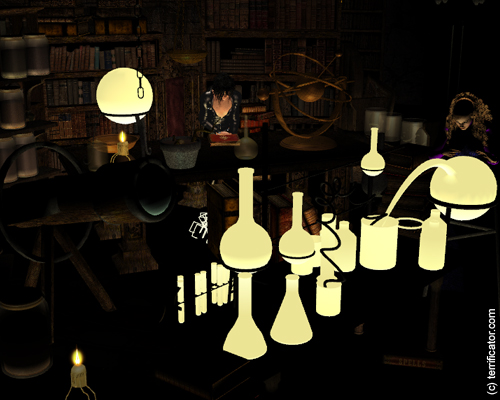WHAT IS ALCHEMY?
14 July 2011 11:00 0 messages

July 14th, 2011 - Alchemy contributed largely to the creation of what it refers to the term of "chemistry". It is worth considering that it has discovered a great number of new bodies (acid sulphuric, water levels, phosphorus, antimony, etc), and invented many technical processes which are still used today into modern laboratories. But those things are under silence in the name of the triumphing rationalism.
But the real nature of this art has a truth which has to be known.
Alchemy is not -as scientists claimed today- a so called science from the Middle Ages whose aim is transmuting metals and more particularly gold. It is much more: its is at the same time a philosophy and a mystic, a secret doctrine in which the theoretical scientists and the religious aspirations mix together narrowly.
It rises from the most distant past, its origins come from the most remote rites of humanity: it goes on and consumes the very old dream of the homo faber i.e. the collaboration of the man to the improvement of the matter while assuring his own perfection.
The aim of the Alchemists is the research of the Philosopher’s stone which has to allow the transmutation of metals and to lead to the discovery of an universal medicine. The alchemists believe in the unit of the matter (theory checked by modern scientific research). They suppose that metals are alive and that in health condition, they must appear under the form of gold, which is the perfect metal. Health is given back by the production of the Philosopher’s stone which after been liquified, gives the Elixir of long life and the Panacea, a miracle cure restoring forces and health. This kind of universal medicine aims at finding what one would call today a cellular regenerator. On this logical and scientific basis, are sticked other marvellous capacities: it was affirmed that the Philosopher’s stone has to make his owner invisible and to enable him to command to the celestial forces and to move in space. Also we can mention the research of Alkaest, an universal solvent able to dissolve all materials and that final goal of the creation of life -the same concern of our modern scientists- the artificial creation of a man, the Homunculus.
Chineses knew already alchemy around 4500 years B.C. and closer to us, it is in Egypt and especially, in Alexandria that alchemy developed itself, then transmitted to the Byzantines and then the Arabs. Arabs introduced alchemy in the West thanks to their warlike conquests during the first millenium and they are the Christian Crusaders at the return of the East who achieved to spread it through the european nations.
Its name comes from the Arabic term el-kimyâ: kimyâ coming probably of khem i.e. "black country", term which was the name of Egypt in Antiquity. Indeed, it is in Egypt where alchemy seems to have known initially the greatest blooming. About its origins, there are two main legends: the first tells they were the fallen angels who taught it to the human women because they fell in love with them. Then, these secrecies became the prerogative of the Egyptian priests who revealed them in turn to the Jews who in turn revealed them to the world.
On the contrary, the second legend tells that alchemy comes from to the god Hermes Trismegistus, (congruence of the greek god Hermes with the Egyptian one Thoth who were the gods of writing and magic), inventor of arts and sciences. It is under this patronage that alchemy is indebted for its name: the hermetic art.
Too often, alchemy has been discredited by many charlatans, poisoners, counterfeiters and dangerous insanes who profited from people credulity and mislead them.
However, true alchemists existed and go on existing and followers belong to all social classes. Moreover, they are the first to scorn and denounce the cupidity of those who imitate them without sharing their philosophy because if they try to make gold, it is not for richness but to demonstrate a material proof of their system.
Alchemists have a constant worry: keeping secrecy. The teaching of their methods is especially oral and their writings is of an uncomprehensible esotericism. The reason of this attitude is simple: one should not put at the range of the common people, processes of which they could misuse. Indeed, knowledge requires detachment which acquires itself by intellectual efforts and reflection, easiness being the mother of funest errors.
And so, the books of alchemy are truffled with strange symbols, anagrams, enigmas, acrostics and fables whose deep sense has to be penetrated. The "dog devoured by a wolf" means the purification of gold by antimony, the "green lion" is vitriol", the "salamander" is the fire, "Venus" is the copper". The philosopher stone is indicated by the word Azoth, formed by the initial letter common to all the alphabets: A, followed by the last letter of the alphabet, Latin, Greek and Hebrew, meaning that
the stone is "the principle and the end of any body".
Paracelse, from his real name Theophraste Bombast von Hohenheim (1493 - 1541), born in Einsiedeln (Swiss), graduate of medicine in his time, is the most famous Alchemist whose name reached us: "Because the malicious ones, if they knew the Secrecy, would make bad use and would upset the world with it".
Alchemist philosophy and mercantiles exploitation of the homo faber quest never created happy marriages: for alchemists, atoms transmutation and the funest consequences of the explosion of the japanese nuclear plant of Fukushima resounds as a terrific example.
Merlin who is a famous legendary character was a magician but also an alchemist.
Also in this section
14 September 2023 – WE LIVE IN ASSIAH
5 September 2023 – MAGIC INFLUENCES
1 September 2023 – TALISMAN AND MAGIC
12 September 2022 – WHEN NOSTRADAMUS CHANGED THE COURSE OF HISTORY
15 June 2022 – HUMAN FUNDAMENTALS AND BAPHOMET



